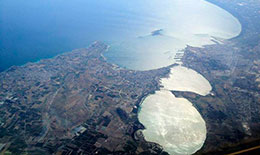Environment: EU project launch of lagoon remediation in Southern Italy
14/4/2016
The ENEA-coordinated project “A new life for Mar Piccolo”, for the environmental remediation of one of the most beautiful but polluted Italian internal sea, has begun to the benefit of tourism and sea - related economic activities.
 Significantly reduce pollution of the Mar Piccolo in Taranto in order to have positive effects on the tourism industry and the economic activities related to a basin unique in Europe. This is the objective of the project “A new life for Mar Piccolo”, coordinated by ENEA and co-financed by the European Commission under the Life Programme 2014, envisaging the reclamation of a portion of one of the “shelves” of the inner sea of Taranto, the one closer to the city.
Significantly reduce pollution of the Mar Piccolo in Taranto in order to have positive effects on the tourism industry and the economic activities related to a basin unique in Europe. This is the objective of the project “A new life for Mar Piccolo”, coordinated by ENEA and co-financed by the European Commission under the Life Programme 2014, envisaging the reclamation of a portion of one of the “shelves” of the inner sea of Taranto, the one closer to the city.
The technical intervention will be carried out thanks to a pilot depuration plant based on a microfiltration membrane technology that works both for seafloor sediments and waters. Last generation devices will guarantee constant monitoring of chemical - physical and bio-molecular parameters of the whole interested area.
“The project – Gaetano Perrotta, researcher at ENEA, points out – entails the removal of pollutants from surface sediments or partly suspended in water, in order to restore the ecological balance of the area. It’s easy to see – he adds- how the technologies developed by the project can promote a rapid restoration of much larger areas than Mar Piccolo, giving back to the local community an extraordinary beautiful environment, strongly attractive both to naturalistic tourism and profitable economic activities”.
The innovative approach and the know-how generated by the project may have positive effects from both a scientific and socio-economic standpoint. Advanced molecular analysis on the “miocrobiome” of the Mar Piccolo will allow to identify microorganisms and enzymatic functions able to convert some polluting compounds into harmless by-products with possible industrial value.
The project will be implemented by an Italian Consortium coordinated by ENEA, comprising the Taranto Municipality, CNR-IAMC, GENELAB Ltd. and Nova Consulting Ltd.. In the long term, the techniques utilized will be able to contribute to the environmental remediation of other basins having the similar characteristics of pollution from heavy metals such as, for instance, polycyclic aromatic hydrocarbons (IPA) and polychlorobiphenyls (PCB)
For more information please contact:
Gaetano Perrotta, ENEA Trisaia Research Center, gaetano.perrotta@enea.it
